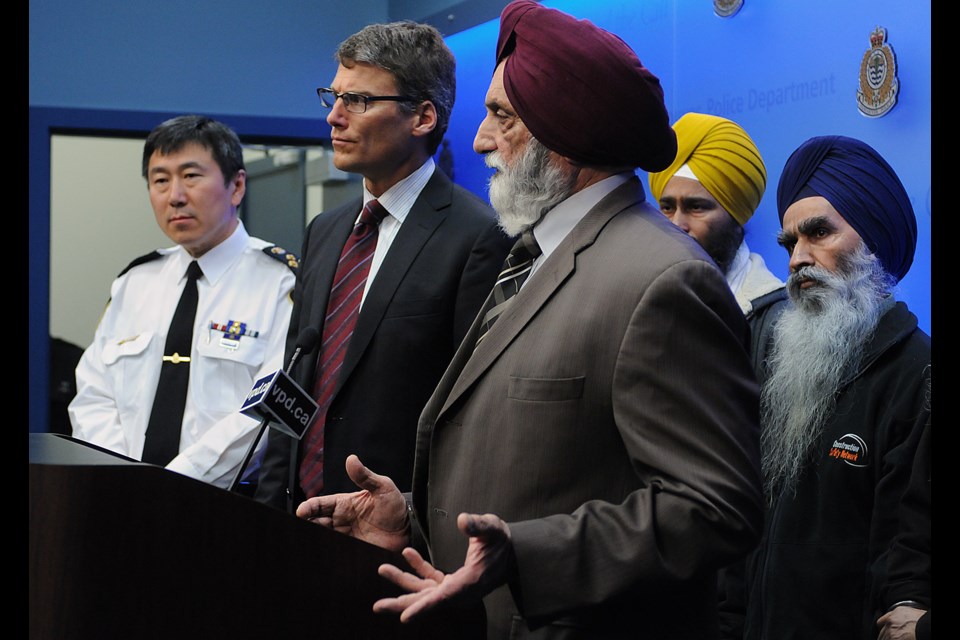The man who apologized for urinating on the Komagata Maru monument in December will receive treatment from a specialized mental health team that police believe is reducing conflicts with officers.
Police Chief Jim Chu said the man, who is well known to police and lives in a single-room occupancy hotel in the Downtown Eastside, was referred to one of the city’s assertive community treatment teams.
“Those teams have been successful in reducing the number of times their clients come in conflict with the criminal justice system,” Chu told reporters at a press conference Thursday at the Cambie Street police precinct.
The teams, commonly referred to as ACT teams, include registered nurses, social workers, occupational therapists, substance use specialists and psychiatrists.
Chu didn’t elaborate on the type of treatment the man will receive but the stated goal of the teams is to provide a customized array of services to keep patients out of hospital and help them live a life not driven by their illness.
The chief described the man, whose act was captured in a photograph and posted widely online, as a severely drug-addicted mentally ill person. Though Chu said the act was “abhorrent”, police chose not to recommend charges or issue a bylaw ticket.
“The suspect needs the health system, not the justice system,” he said.
Chu noted the man probably didn’t realize the significance of the monument, which was erected in Coal Harbour to commemorate the government’s refusal in 1914 to allow 352 passengers from India to disembark in Vancouver.
Several South Asian community leaders, including Khalsa Diwan Society President Sohan Deo, joined Chu at the press conference and agreed with the police’s decision not to proceed with charges.
Though Deo said the South Asian community was upset about the man’s act, he and others have learned of the man’s troubles and that he apologized for desecrating the monument.
“We should accept that,” said Deo, who stood at a lectern in front of seven other South Asian leaders, including Vancouver Police Board member Daljit Sidhu. “The way the police and the mayor and everybody acted on behalf of the community, I think we should be very thankful for that.”
The incident again brought to light what Chu and Robertson have pointed out in recent months — that the city is experiencing a crisis with people suffering from severe mental health problems.
The day after the press conference, police arrested a 43-year-old man who barricaded himself for 11 hours in his house on Manor Street, near Euclid.
The man allegedly assaulted a person and had warrants for assault, assaulting a police officer and attempting to disarm an officer.
“It is believed deteriorating mental health may be a factor,” said Const. Brian Montague, a media liaison officer, in a release issued Friday morning.
Police have seen a significant increase in the number of incidents involving mentally ill people. In 2010, police recorded 2,278 incidents and that jumped to 2,489 in 2011. In 2012, the number increased again to 2,636.
In October of last year, police said there had been a 23 per cent increase over 2012. The police and the provincial government continue to work on addressing the problem.
In November, provincial Health Minister Terry Lake announced a $20 million plan to respond to immediate and long-term health needs of people suffering from a mental illness.
The plan includes 12 new beds at St. Paul’s Hospital for psychiatric patients, programs to support people aged 16 to 24 with mental illness, group homes, more beds at the Burnaby Youth Custody Centre and more ACT teams.



